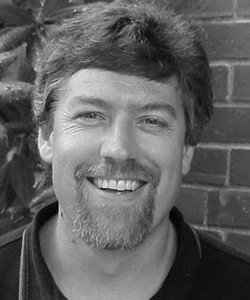DR. R. MARK LECKIE
University of Massachusetts-Amherst
2004-2005 Distinguished Lecturer
Linking Tectonics, Climate Change, and Biotic Evolution: The Oceanic Anoxic Events of the Mid-Cretaceous (~120-90 MA)
University of Massachusetts-Amherst
2004-2005 Distinguished Lecturer
Linking Tectonics, Climate Change, and Biotic Evolution: The Oceanic Anoxic Events of the Mid-Cretaceous (~120-90 MA)
 What was so unusual and unique about the mid-Cretaceous? It was a time of active tectonics both within and between plates, rising sea level and the creation of large epicontinental seas, global warming, vast burial of organic matter, and accelerated rates of biotic turnover and evolutionary innovation. The mid-Cretaceous was also marked by the appearance of several Large Igneous Provinces (LIPs) and by increased ocean crust production, which impacted the geosphere, hydrosphere, atmosphere, and biosphere. Oceanic Anoxic Events (OAEs) were short-lived episodes of organic carbon production and burial that were global or Atlantic-Tethyan in extent. What triggered the OAEs? Possible mechanisms include intense submarine volcanism, feedbacks in the ocean-climate system, and changes in ocean gateways. Scientific ocean drilling has been at the forefront of discovery to define the extent and character of the OAEs, as well as testing of hypotheses concerning the causes and consequences of these major perturbations to the global carbon cycle. The biomarkers of ancient microbial communities and the shells of microfossil plankton preserved in deep-sea sediments hold important keys to understanding the OAEs. The deep-sea sediment record provides clear evidence of ecosystem disruption, and the evolutionary opportunities that these events provided. The mid-Cretaceous is a wonderful laboratory to study past global change, and to consider the implications on Earth’s future change.
What was so unusual and unique about the mid-Cretaceous? It was a time of active tectonics both within and between plates, rising sea level and the creation of large epicontinental seas, global warming, vast burial of organic matter, and accelerated rates of biotic turnover and evolutionary innovation. The mid-Cretaceous was also marked by the appearance of several Large Igneous Provinces (LIPs) and by increased ocean crust production, which impacted the geosphere, hydrosphere, atmosphere, and biosphere. Oceanic Anoxic Events (OAEs) were short-lived episodes of organic carbon production and burial that were global or Atlantic-Tethyan in extent. What triggered the OAEs? Possible mechanisms include intense submarine volcanism, feedbacks in the ocean-climate system, and changes in ocean gateways. Scientific ocean drilling has been at the forefront of discovery to define the extent and character of the OAEs, as well as testing of hypotheses concerning the causes and consequences of these major perturbations to the global carbon cycle. The biomarkers of ancient microbial communities and the shells of microfossil plankton preserved in deep-sea sediments hold important keys to understanding the OAEs. The deep-sea sediment record provides clear evidence of ecosystem disruption, and the evolutionary opportunities that these events provided. The mid-Cretaceous is a wonderful laboratory to study past global change, and to consider the implications on Earth’s future change.
Dr. Leckie has been involved in scientific ocean drilling since 1981 when he sailed as a foraminiferal biostratigrapher on DSDP Leg 79. Since then, he has sailed on five ODP legs: 101 (Bahamas), 130 (Ontong Java Plateau), 165 (Caribbean; co-chief scientist), 198 (Shatsky Rise), and 210 (Newfoundland Basin). Dr. Leckie has served on the Ocean History Panel and he is currently a member of USSAC.
January 24, 2004 – University of North Dakota
September 27, 2004 – Maine Maritime Academy
October 13, 2004 – Eastern Kentucky University
October 19, 2004 – Indiana University-Purdue University Indianapolis
January 20, 2005 – University of Illinois at Chicago
February 18, 2005 – Iowa State University